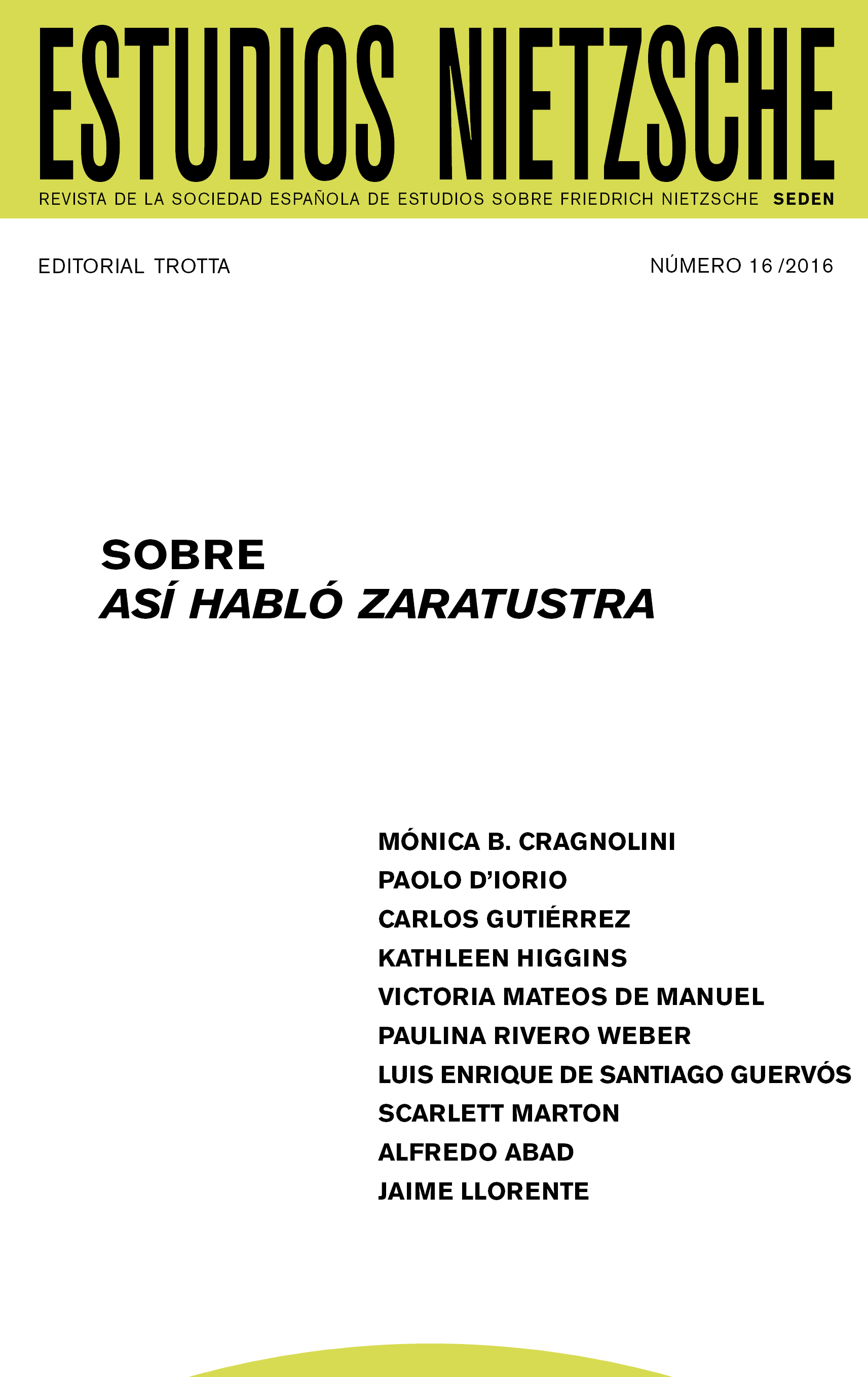Genesis and psycho-biographical context of the four parts of Thus Spoke Zarathustra
DOI:
https://doi.org/10.24310/EstudiosNIETen.vi16.10819Keywords:
Zarathustra, genesis, eternal recurrence, contextualizationAbstract
To understand Nietzsche’s Thus spoke Zarathustra, a work that is not born in a unitary manner, it is necessary to explain how it was conceived and the special circumstances surrounding it, with all their motivations. This book does not imply a drastic disruption in relation to previous works. Nietzsche places this work at the centre of all his writings. This paper presents the chronology of the publication of the four parts of the book, its
conceptual and biographical context, and the details of this unique work.
Downloads
Metrics
References
Brobjer, Thomas, «Thus Spoke Zarathustra as Nietzsche’s Autobiography», en James Luchte (ed.), Nietzsche’s Thus Spoke Zarathustra. Before Sunrise. London: Continuum International Publishing, 2008.
Brown, Malcolm B., Friedrich Nietzsche und sein Verleger Ernst Schmeitzner: eine Darstellung ihrer Beziehung. Frankfurt am Main: Buchhändler-Vereinigung, 1987.
Gadamer,H.-G. «El drama de Zaratustra», en Estudios Nietzsche 3 (2003), pp. 115-130.
Haase, Marie-Luise, Zur Überlieferung und Entstehung von «Also sprach Zarathustra», en KGW VI/4,934-978.
Hollinrake, Roger, Nietzsche, Wagner and the philosophy of Pessimism. London: Routledge, 2015.
Montinari, M., Lo que dijo Nietzsche. Barcelona: Salamandra, 2003.
Nietzsche, Elisabeth, Der Einsame Nietzsche. Leipzig: Kröner, 1913
Nietzsche, F., Obras Completas, I-IV (OC ). Director ed. Diego Sánchez Meca. Madrid: Tecnos, 2011-2016
Nietzsche, F., Correspondencia I-VI. (CO). Director ed. Luis E. de Santiago Guervós. Madrid : Trotta, 2005- 2012.
Nietzsche, F., Fragmentos Póstumos I-IV (FP). Director ed. Diego Sánchez Meca. Madrid: Tecnos, 2006-2010.
Salaquarda, J, «Der sohn des “Elephanten-Weibchens”. Nietzsches Theorie des Schaffens und die psychologisch-biografische Auslegunng von Also sprah Zarathustra,» en Schmirmer, Andreas,/ Schmidt, Rüdiger (ed.),
Entdecken und Verraten. Zum Leben und Werk F. Nietzsches, Weimar: Böhlau, 1995, pp. 213-224.
Schaberg, William H., The Nietzsche Canon. A publication History and Bibliography. Chicago: University of Chicago Press, 1995.
Scheier, Claus, Introducción a Nietzsche Friedrich: Ecce Autor. Die Vorreden von 1886. Hamburgo: Felix Meiner, 1990.
Downloads
Published
How to Cite
Issue
Section
License

This work is licensed under a Creative Commons Attribution-NonCommercial-ShareAlike 4.0 International License.
As of issue 21 (2021) this journal is published only in open access (diamond route).
From that number 21, like the previous numbers published in NIETZSCHE STUDIES, they are subject to the Creative Commons Acknowledgment-NoComercia-ShareIgual 4.0 license, the full text of which can be consulted at <http://creativecommons.org/licenses/by-nc-sa/4.0 >
It is the responsibility of the authors to obtain the necessary permissions of the images that are subject to copyright.
This work is licensed under a Creative Commons Attribution-NonCommercial-ShareAlike 4.0 International License.
Copyright generates two different rights: moral rights and patrimonial rights that EJFB recognizes and respects. Moral rights are those relating to the recognition of the authorship. They are rights of a personal nature that are perpetual, inalienable, unseizable and imprescriptible as consequence of the indivisible union of the author and his/her work.
Patrimonial rights are those that can be derived from the reproduction, distribution, adaptation or communication of the work, among others.







11.png)
